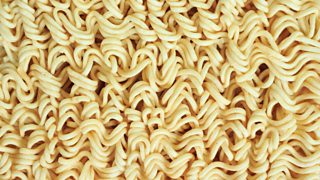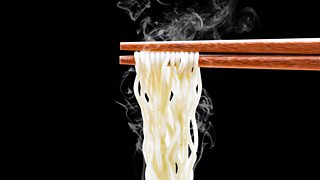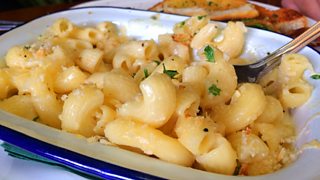Are carbs your friend or foe?
Carbohydrates. A crucial source of fibre and nutrients that give us all the energy we need? Or an unnecessary bulk food that plays havoc with our blood sugar?
The Food Programme tackles The Big Carb Debate by inviting a panel of four dietary experts to discuss the merits of a low- versus a high-carbohydrate diet. They attempt to answer some of the questions and bust some of the myths surrounding this hotly debated topic.
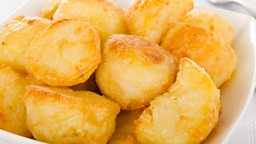
Carbohydrates are one of three main nutrient groups found in food, along with fat and protein. Most of the things we eat are made up of differing ratios of these three macronutrients.
There are three different types of carb: starch, sugar and fibre. In the UK we eat a lot of potatoes, wheat and corn based carbs, and we get through large quantities of refined carbohydrates – like pasta, white bread, cake and biscuits. (In fact, a recent study shows that our consumption of highly processed foods, and therefore sugars, outstrips 18 other developed nations!)
What are the arguments in favour of carbs?
According to government guidelines set out in the Eatwell Guide “a third of our intake should come from starchy carbohydrates,” states Professor Louis Levy, head of nutrition science at Public Health England.
• Carbs give us energy and aid exercise
Carbohydrates are our main source of fuel. The body breaks the starch down into sugars and absorbs them into the bloodstream – creating glucose. Carbs are converted into the energy we all need to keep our bodies and brains on task – from playing basketball to simply breathing. Carbohydrates, fat and protein all provide energy, but during cardiovascular workouts the body burns sugars faster. Carbs are quicker to process and convert into energy. A low carb diet can lead to low energy and increased fatigue during exercise.
• Carbs are an important source of fibre
There’s good evidence that fibre can reduce the risk of cardiovascular disease, type 2 diabetes and bowel cancer. We get a lot of our fibre from starchy carbohydrates so by reducing our consumption of these carbs, we risk losing our fibre intake. As Anthony Warner, aka The Angry Chef, states, “if you’re discouraging people from eating carbohydrates, that makes eating enough fibre quite difficult.”
We can get fibre from fruit and vegetables but, as Megan Rossi from Kings College London points out, “there’s close to a hundred different types of fibre”, all of which play a different role in our health. One study shows that people eating cereal-based fibres had a decreased risk of colorectal cancer. By cutting out whole grains, she says, we deny ourselves a “a very unique type of fibre.”
• Carbs can cure constipation!
Roughage is the fibrous material in vegetable based foods that the body can’t digest, and it’s crucial for getting food and waste moving through our intestines. We get most of our roughage from starchy carbs.

Do protein supplements help you build muscle?
There's been a big growth in protein supplements as the ideal body type has changed.

-
![]()
The Big Carb Debate
The Food Programme invites a panel of four to discuss the merits of a low versus high carbohydrate diet.
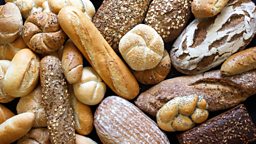
• Carbs are a source of nutrients
Healthy sources of carbohydrate (vegetables, fruits, and legumes) are also an important source of vitamins and minerals such as calcium, zinc, iron and B vitamins. Cut out carbs and you’re also cutting back on these essential nutrients.
• If you reduce your carb intake it could mean a higher fat diet
Carbs like pasta and potatoes add bulk to our meals and help us to feel full and satisfied after eating. Reducing the amount of carbohydrates you eat and replacing them with more fatty proteins like a lot of red meat and cheese could increase your intake of saturated fat, which can raise the amount of cholesterol in your blood.
What are the arguments against carbs?
Some people, including medical professionals and patients, are choosing to significantly reduce the amount of carbohydrates they’re eating – thereby rejecting the guidelines on nutritional health issued by Public Health England. In some cases, cutting carbs is about managing obesity or diabetes. But some of us are going low-carb simply because we think it makes us feel better.
• Carbs cause blood sugar peaks and troughs
Eating refined carbs causes our blood-sugar levels to fluctuate dramatically: carbohydrates that are broken down quickly cause a spike in blood sugar, followed by a “crash”. Most of us will have experienced this post-pasta, mid-afternoon slump in energy and mood. A low carb diet means more stable blood sugars.
These peaks in our blood sugar levels can have more serious implications than just feeling sleepy between meals. A spike in glucose triggers your body to respond with a surge of insulin. Dr Aseem Malhotra, one of the most influential cardiologists in the country, explains how eating refined carbohydrates is “clearly linked, very strongly” to “obesity and type two diabetes.” One audience member from the Food Programme's Big Carb Debate, Margery, supports this view. She tackled her diabetes diagnosis by cutting carbs: “I’ve been able to reverse my condition with the aid of a low-carb diet… I’m now off all diabetic medication.”

• Proteins and fats keep you fuller for longer
Carbohydrates cause your body to retain water. The more pasta and rice you eat, the more bloated you can feel. Carbs might fill you up in the short-term, but that full feeling will soon wear off. In contrast, low GI foods like proteins and fats help blood sugar levels rise and fall slowly, which can help you to feel fuller for longer.
• Not all carbs contain fibre
We’ve heard how carbs are a good source of fibre. But it’s worth noting that a lot of the carbohydrates we eat contain very little fibre: when they’re refined the bran and fibre is taken out. We can find more fibre in fruit, vegetables, pulses and legumes than pasta or pastries.

The fool-proof trick to cook pasta to perfection
Jay Rayner, Dr Annie Gray, Rachel McCormack, Tim Hayward and Sophie Wright share tips.
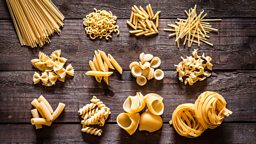
Are carbs friend or foe?
With convincing points for and against the consumption of carbs, what’s the answer?
In truth, it’s about finding a balance. Fiona Godlee of the British Medical Journal says the National Institute of Health study published in early 2018 showed that “low-carb and very high-carb were both detrimental to your mortality.” And crucially, despite the guidelines, it’s clear that a one-size-fits-all approach simply doesn’t work. It “just isn’t appropriate,” says Fiona. “Some people do better on some diets and some people do better on others.” So it’s knowing what works for you.
Most importantly, it’s about eating the right type of carbs. We should opt for a wide range of high fibre carbs like whole wheat, oats, quinoa and kale, and avoid simple carbohydrates like cakes, baguettes and biscuits – which are often high in fat and added sugar. It’s time to swap the sweets for the sweet potatoes!
For more information on what you have read, listen to The Big Carb Debate episode of The Food Programme.
-
![]()
The Big Carb Debate
The Food Programme invites a panel of four to discuss the merits of a low versus high carbohydrate diet.
-
![]()
Some of the ways in which social media platforms have fed what we eat.
-
![]()
Unusual facts about one of the world’s best-loved staples.
-
![]()
Eight Mighty Mac 'n' Cheese Facts
A dish has crossed cultures and classes to be the world's favourite comfort food.
